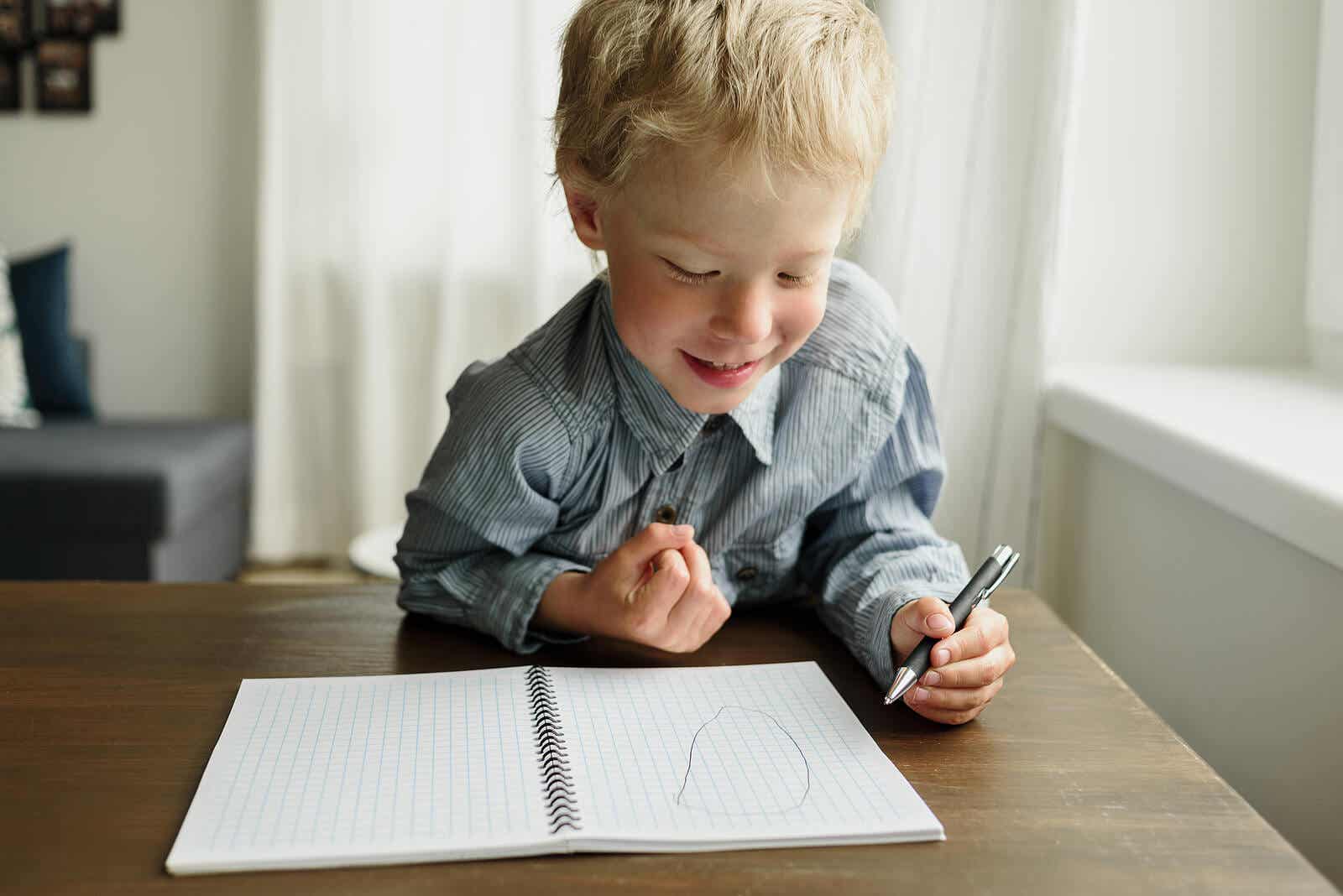Why is Excessive Perfectionism a Problem for Children?

Many children try to look for perfection in the things they do. Besides, they’re extremely meticulous and too demanding. If they do something wrong, they try to do it again. However, you should know that excessive perfectionism can become a problem when it interferes with their everyday life.
Perfectionist children get so upset when a drawing isn’t what they expected that they may even tear the paper into pieces. Moreover, if they try to put an object in a certain place and they don’t manage to do it, they may end up throwing that object away. These are common behaviors in perfectionist children.
Do you want to know why excessive perfectionism can be a problem for children? How can we help them? In this article, we’ll answer all these questions.
Healthy and unhealthy perfectionism
Authors, Kottman (2000) and Blatt (1995) state that perfectionism has two faces: one of them is related to a psychological disorder, and another one is related to regular adaptation functions. Let’s see each one of them.

Healthy perfectionism
In the case of healthy perfectionism, children set high goals, which are reasonable. Therefore, they have high expectations. In addition, they’re demanding, critical, organized, punctual, and careful, but not in an exaggerated way.
These children try to use their whole potential, and they don’t give up when they fail. In fact, they use their failures as a motivation to try harder. In addition, they recognize their own limitations, and they don’t force themselves to be perfect at everything they do.
Unhealthy perfectionism
In this case, children are fully aware of what they want to become, and those thoughts are too strict and irrational. As a result, they end up feeling upset and having psychological problems.
Furthermore, these children react in an exaggerated way, become really sad, feel guilty and angry, and become ashamed and frustrated when they think they’ve failed.
Why is excessive perfectionism a problem for children?
As we’ve mentioned before, when children want to achieve their goals by being disciplined, they’re not doing anything wrong. However, perfectionism isn’t always healthy, and it can be quite problematic for many children.
So, perfectionism becomes a problem when children:
- Avoid trying new activities or sports because they’re afraid of failing. Before doing something new, they analyze the results they may get. Therefore, they avoid activities they’re not sure about.
- Fail and find it hard to overcome their failure. In other words, when they think they’ve failed, they prefer to stop doing what they’re doing.
- Are extremely self-critical. Whenever they make a mistake, they feel they can’t do anything right.
- Refuse to carry out an activity, because conditions aren’t perfect.
- Find it hard to feel satisfaction or joy whenever they achieve a goal that they didn’t consider to be difficult.
We must be aware of these signs, which indicate that excessive perfectionism has become a problem for our children. Once we realize this, we must find a solution.
Consequences of excessive perfectionism in children
In fact, this obsession with being perfect may lead to psychological problems. In this case, our children will need psychological help.
- Anxiety.
- Self-esteem problems.
- Depression.
- Obsessive-compulsive disorder.
- Social isolation.
- Eating disorders.

How can we help our children?
Let’s see what we can do as parents if we notice our children are excessively perfectionists. Even though we can do things at home to make this situation better, it’s important to remember that, in case things become difficult, children may need professional help. A professional will help us to change these irrational thoughts about perfectionism.
- Avoid phrases such as, “You’re the best!” “You’re the smartest!” “You’re good at everything!” Even though they seem harmless, children may think they have to be that way, so they’ll become too demanding.
- Set an example. If we make a mistake and become really angry, we’ll be sending a negative message regarding failure. It’s important to give less importance to mistakes.
- Praise effort more than success. You can divide their goals into different objectives and praise them for their effort. This way, we’ll be giving less importance to the final goal, which is always harder to get.
- Teach them the value of making mistakes. In order to do this, tell them that making mistakes isn’t a negative thing. Quite the contrary, they’ll learn from the mistakes they make. In fact, science and great inventors have evolved thanks to different mistakes, which helped them improve themselves.
About excessive perfectionism
In conclusion, as we’ve seen in this article, excessive perfectionism can be quite problematic for children, and you should find a solution to it. It’s important for parents to identify whether there’s a problem or not.
Once we watch our children’s reactions to failure, we’ll identify if they’re perfectionists or not. If our children achieve a very good, but not perfect result and they aren’t happy about it, there might be a problem. And, remember that, if it’s necessary, you must ask for professional help.
Many children try to look for perfection in the things they do. Besides, they’re extremely meticulous and too demanding. If they do something wrong, they try to do it again. However, you should know that excessive perfectionism can become a problem when it interferes with their everyday life.
Perfectionist children get so upset when a drawing isn’t what they expected that they may even tear the paper into pieces. Moreover, if they try to put an object in a certain place and they don’t manage to do it, they may end up throwing that object away. These are common behaviors in perfectionist children.
Do you want to know why excessive perfectionism can be a problem for children? How can we help them? In this article, we’ll answer all these questions.
Healthy and unhealthy perfectionism
Authors, Kottman (2000) and Blatt (1995) state that perfectionism has two faces: one of them is related to a psychological disorder, and another one is related to regular adaptation functions. Let’s see each one of them.

Healthy perfectionism
In the case of healthy perfectionism, children set high goals, which are reasonable. Therefore, they have high expectations. In addition, they’re demanding, critical, organized, punctual, and careful, but not in an exaggerated way.
These children try to use their whole potential, and they don’t give up when they fail. In fact, they use their failures as a motivation to try harder. In addition, they recognize their own limitations, and they don’t force themselves to be perfect at everything they do.
Unhealthy perfectionism
In this case, children are fully aware of what they want to become, and those thoughts are too strict and irrational. As a result, they end up feeling upset and having psychological problems.
Furthermore, these children react in an exaggerated way, become really sad, feel guilty and angry, and become ashamed and frustrated when they think they’ve failed.
Why is excessive perfectionism a problem for children?
As we’ve mentioned before, when children want to achieve their goals by being disciplined, they’re not doing anything wrong. However, perfectionism isn’t always healthy, and it can be quite problematic for many children.
So, perfectionism becomes a problem when children:
- Avoid trying new activities or sports because they’re afraid of failing. Before doing something new, they analyze the results they may get. Therefore, they avoid activities they’re not sure about.
- Fail and find it hard to overcome their failure. In other words, when they think they’ve failed, they prefer to stop doing what they’re doing.
- Are extremely self-critical. Whenever they make a mistake, they feel they can’t do anything right.
- Refuse to carry out an activity, because conditions aren’t perfect.
- Find it hard to feel satisfaction or joy whenever they achieve a goal that they didn’t consider to be difficult.
We must be aware of these signs, which indicate that excessive perfectionism has become a problem for our children. Once we realize this, we must find a solution.
Consequences of excessive perfectionism in children
In fact, this obsession with being perfect may lead to psychological problems. In this case, our children will need psychological help.
- Anxiety.
- Self-esteem problems.
- Depression.
- Obsessive-compulsive disorder.
- Social isolation.
- Eating disorders.

How can we help our children?
Let’s see what we can do as parents if we notice our children are excessively perfectionists. Even though we can do things at home to make this situation better, it’s important to remember that, in case things become difficult, children may need professional help. A professional will help us to change these irrational thoughts about perfectionism.
- Avoid phrases such as, “You’re the best!” “You’re the smartest!” “You’re good at everything!” Even though they seem harmless, children may think they have to be that way, so they’ll become too demanding.
- Set an example. If we make a mistake and become really angry, we’ll be sending a negative message regarding failure. It’s important to give less importance to mistakes.
- Praise effort more than success. You can divide their goals into different objectives and praise them for their effort. This way, we’ll be giving less importance to the final goal, which is always harder to get.
- Teach them the value of making mistakes. In order to do this, tell them that making mistakes isn’t a negative thing. Quite the contrary, they’ll learn from the mistakes they make. In fact, science and great inventors have evolved thanks to different mistakes, which helped them improve themselves.
About excessive perfectionism
In conclusion, as we’ve seen in this article, excessive perfectionism can be quite problematic for children, and you should find a solution to it. It’s important for parents to identify whether there’s a problem or not.
Once we watch our children’s reactions to failure, we’ll identify if they’re perfectionists or not. If our children achieve a very good, but not perfect result and they aren’t happy about it, there might be a problem. And, remember that, if it’s necessary, you must ask for professional help.
All cited sources were thoroughly reviewed by our team to ensure their quality, reliability, currency, and validity. The bibliography of this article was considered reliable and of academic or scientific accuracy.
Oros, L. B. (2005). Implicaciones del perfeccionismo infantil sobre el bienestar psicológico: Orientaciones para el diagnóstico y la práctica clínica. Anales de Psicología. 21 (2), 294-303.
This text is provided for informational purposes only and does not replace consultation with a professional. If in doubt, consult your specialist.








